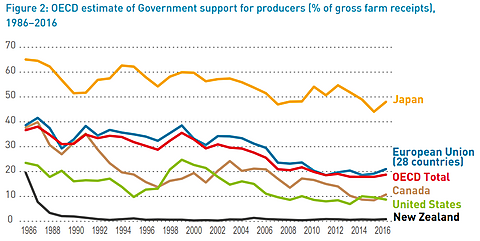Chris Edwards
With Congress scheduled to reauthorize farm subsidies this fall, lawmakers should consider reform lessons from New Zealand. Facing high budget deficits in the 1980s, New Zealand cut government spending, including eliminating nearly all farm subsidies. That was an impressive reform because the country is highly dependent on agriculture. Since then, New Zealand has remained a model of market‐based farming.
The chart shows producer subsidy levels as a percent of farm receipts, as calculated by the Organisation for Economic Co‐operation and Development (OECD). New Zealand hands out the least producer subsidies among OECD countries. The United States is below average, but there is room for improvement compared to New Zealand.
The chart is from a 2017 New Zealand government review of agriculture, as are the following quotes.
Prior to reforms in the 1980s, New Zealand provided an array of farm supports, including “minimum prices for agricultural goods, input subsidies, low‐interest loans, tax incentives and debt write‐offs.”
As a result, “farmers became less responsive to market signals … and resources were not used efficiently.” Farm productivity decreased “as the support payments provided a secure income without the need to innovate.” A further problem was that “as subsidies were capitalised into land prices, few young farmers could afford to buy land.”
It was clear by the mid‐1980s that farm subsidies were causing damage. The New Zealand government changed course and ended nearly all subsidies. Its “objectives for reform were to create a level playing field, effectively treating farming like any other business.”
The reforms were successful. After some difficult adjustments during the 1980s, a more efficient agriculture industry emerged in the 1990s. “New Zealand has about the same number of people employed in agriculture today as it did in the pre‐reform era. Agriculture productivity has quadrupled … There was also an indirect positive impact on the environment.”
Today, New Zealand “does not use export subsidies or trade distorting domestic support for any agricultural product.” Agriculture “is run as any other business; production decisions and market returns are dictated by the domestic and overseas markets. Sales depend on meeting customers’ expectations of price, quality, integrity of the supply chain and sustainability.”
New Zealand debunked the myth that farming cannot prosper without subsidies. The reforms led to the agriculture “industry being better placed to respond to market demand, in addition to being more competitive, more responsive, and significantly less burdensome on taxpayers.”
The upshot for U.S. policymakers is that rather than rushing through a giant farm subsidy bill this fall, they should explore lessons on free market farming from down under.
More on U.S. farm policy here and more on New Zealand farm reforms here, here, and here. The latest OECD farm subsidy data are here.

